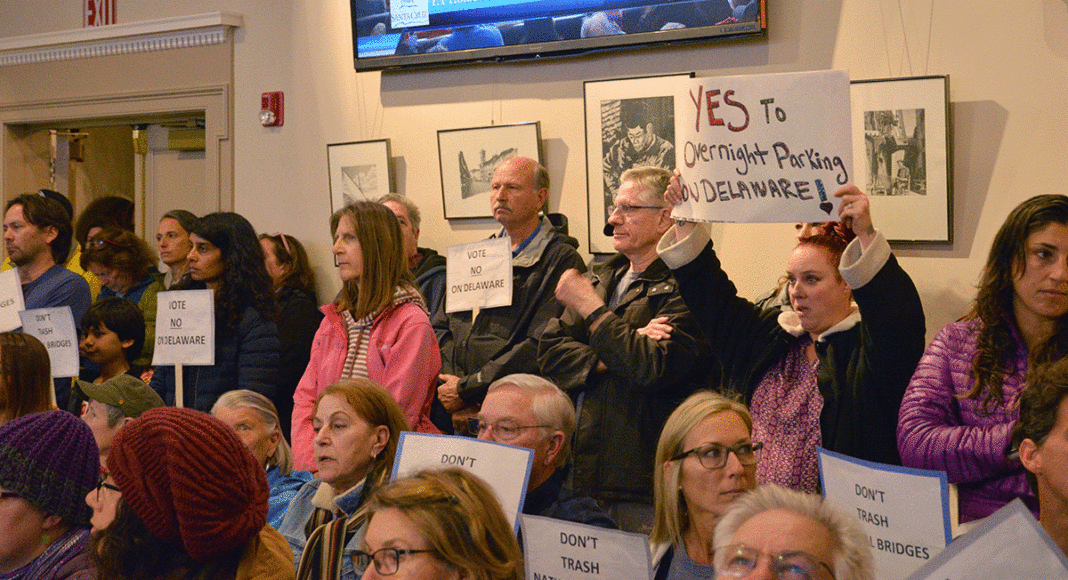Amy Lebichuck, a social worker for Santa Cruz County, has made a point of getting more involved in local politics over the past couple months.
To a newcomer, it’s a strange scene. She told the Santa Cruz City Council on the night of Tuesday, Feb. 26 that she was, “really disturbed to see the two polarized camps” that showed up to weigh in on homeless issues that evening.
“I see folks who are really concerned about safety, and I see folks who are really concerned about social justice issues and human rights,” Lebichuck said. “We all want the same things. As a woman, I want to feel safe walking around town at night.”
Lebichuck implored homeless advocates in the room to be patient, telling them that progress could not happen overnight. She challenged those who have opposed the city’s homeless camp plans to show an openness toward trying out different programs that might alleviate the pain of those living outside and in their cars.
At a meeting that stretched until 1 a.m., the council ultimately voted to extend the life of the Gateway Plaza encampment, sometimes known as the Ross camp, where dozens of tents have clustered near the San Lorenzo Riverwalk. The camp now will stay open until the city assembles alternative services and new shelter options. The change in direction was decided by a 4-3 vote, with the support of Vice Mayor Justin Cummings, Councilmember Drew Glover, Councilmember Sandy Brown, and Councilmember Chris Krohn. The council had previously signaled that it would close the Gateway encampment by March 15.
Cummings said he’s heard from community members that even if the camp is not perfect, it does provide a home base for those in need. “This year has been exceptionally wet and cold, and if we didn’t have this type of shelter, we may have actually been dealing with more deaths from people getting hypothermia,” said Cummings, who visits the camp a few times a week.
NEXT STEPS
Homeless advocates in the audience cheered the decision, which came despite concerns about public safety from neighbors and nearby businesses, as well as law enforcement officials, who said that the camp’s layout can make emergency-response efforts challenging.
The council took four other votes that evening, including one to ask city staff to come back on March 12 with a complete list of possible locations for transitional encampments and safe parking programs. It directed staff to share information with the county, encouraging maximum collaboration between the two governments. Additionally, the council chose to ask staff for information on how its chosen direction works within the framework of the city charter.
A proposal from Glover to establish a state of homeless emergency failed 5-2, with only Glover and Krohn supporting it. The impact of Glover’s suggested declaration was unclear, and it overlapped with a shelter crisis designation that was already in place. The council didn’t vote on a proposal from Glover to lift an overnight parking ban on Delaware Avenue. Many Westside neighbors came out against that idea, some of them holding up signs that said “Don’t Trash Natural Bridges” and “Vote No on Delaware.” Krohn and Councilmember Donna Meyers both said they opposed the change.
The meeting had a huge turnout, with two long lines wrapping around City Hall. In addition to homeless supporters and public safety advocates, the meeting drew immigration activists ready to talk about a recent raid, and union reps eager to talk contracts. Then there were supporters of Mayor Martine Watkins and of Councilmember Drew Glover, after the mayor had called Glover out for alleged sexism and bullying two weeks earlier.
Voting didn’t begin until nearly midnight. The councilmembers piled one vote on after another. A few councilmembers introduced carefully wordsmithed amendments to try and improve on one another’s motions. As the pace of deliberation picked up, the members kept asking one another for clarification, and at one point, the council had two overlapping motions on the floor concurrently, prompting confusion about which should be withdrawn. Members of the council and staff looked quizzically at one another.
During public comment, impassioned remarks veered away from the policies in play, as homeless individuals shared stories about what it’s like to be homeless while pregnant or homeless as a parent. The mother of an 8-year-old said she suffers from Asperger Syndrome and doesn’t qualify for any mental health services. She worries that she may slip into her fifth bout of homelessness if her landlord raises her rent.
Michael Spadafora, who owns Java Junction coffee house in Gateway Plaza, says the encampment has taken a toll on businesses around the corner.
Petsmart employees have had their tires slashed and their cars broken into, he says. Spadafora says he feels bad for everyone living in the camp and would prefer a transitional encampment with a zero-tolerance policy. Nonetheless, he adds that he’s had to close his bathroom after repeated thrashings, and says that Ross has been hiring additional security guards and loss-prevention employees as well.
“Those stores lose $500-1,000 a day through theft,” he says. “All of our employees are afraid to park in our lot. They’re afraid to go to work. They’re afraid that the customer they’re dealing with at the counter is gonna throw coffee on them. Does somebody have an answer why we’re the ones that have to deal with this? None of you do. The police officers do when they come, but it takes them 15 minutes to get there.”













